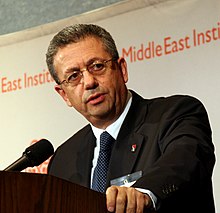Mustafa Barghouti
| Mustafa Barghouti | |
|---|---|
 |
|
|
Palestinian National Initiative candidate for President of the Palestinian Authority |
|
|
Election date January 9, 2005 |
|
| Opponent(s) |
Mahmoud Abbas (Fatah), Taysir Khalid (DFLP) and numerous others. |
| Incumbent | Rawhi Fattouh |
| Personal details | |
| Born |
January 1, 1954 Jerusalem, West Bank |
| Political party | Palestinian National Initiative |
| Occupation | Medical doctor and political activist |
Mustafa Barghouti (Arabic: مصطفى البرغوثي; born January 1, 1954) is a Palestinian physician, activist, and politician who serves as General Secretary of the Palestine National Initiative (PNI), also known as al Mubadara. He has been a member of the Palestinian Legislative Council since 2006 and is also a member of the Palestine Liberation Organization (PLO) Central Council. In 2007, Barghouti was Minister of Information in the Palestinian unity government.
One source has described him as being born in Bait Rima on the West Bank, although Barghouti himself has said that he was born in Jerusalem.
Barghouti's family is from Bani Zeid, a village about 15 miles from Ramallah, neit Birzeit. He grew up in Ramallah and his father was the municipal engineer for the nearby village of Al-Bireh. Barghouti has said that his family “has always been very political, very active,” noting that under the Mandate, his grandfather and great-uncle “were jailed by the British.” He has said that he “grew up surrounded by internationalist, progressive literature,” and has described his family’s politics as always being “shaped by opposition to social injustice, rather than by nationalism.” His father, he has noted, “used to speak to us of his Jewish comrades in Tiberias or Acre.”
He has said that he was “reshaped” by the Six-Day War. “I felt a huge amount of responsibility. My childhood ended then. We were now under occupation. It was the beginning of a life mission: how do we become free? The feeling of injustice was very strong. Though still a child, I felt the whole world sitting on my shoulders…. Some gave in to defeatism—Nasser had it wrong, it was better to adopt a pro-American stance—but our position was: no, we have to resist, but in a stronger, better way. I’ve never felt I was fighting for the liberation of the Palestinian people on purely nationalistic grounds, one people against another. It was a fight against oppression, against occupation.”
...
Wikipedia
